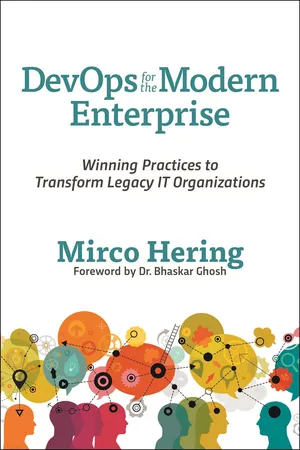
eBook - ePub
DevOps for the Modern Enterprise
Winning Practices to Transform Legacy IT Organizations
- English
- ePUB (mobile friendly)
- Available on iOS & Android
eBook - ePub
About this book
Many organizations are facing the uphill battle of modernizing their legacy IT infrastructure. Most have evolved over the years by taking lessons from traditional or legacy manufacturing: creating a production process that puts the emphasis on the process instead of the people performing the tasks, allowing the organization to treat people like resources to try to achieve high-quality outcomes. But those practices and ideas are failing modern IT, where collaboration and creativeness are required to achieve high-performing, high-quality success.
Mirco Hering, a thought leader in managing IT within legacy organizations, lays out a roadmap to success for IT managers, showing them how to create the right ecosystem, how to empower people to bring their best to work every day, and how to put the right technology in the driver's seat to propel their organization to success.
But just having the right methods and tools will not magically transform an organization; the cultural change that is the hardest is also the most impactful. Using principles from Agile, Lean, and DevOps as well as first-hand examples from the enterprise world, Hering addresses the different challenges that legacy organizations face as they transform into modern IT departments.
Mirco Hering, a thought leader in managing IT within legacy organizations, lays out a roadmap to success for IT managers, showing them how to create the right ecosystem, how to empower people to bring their best to work every day, and how to put the right technology in the driver's seat to propel their organization to success.
But just having the right methods and tools will not magically transform an organization; the cultural change that is the hardest is also the most impactful. Using principles from Agile, Lean, and DevOps as well as first-hand examples from the enterprise world, Hering addresses the different challenges that legacy organizations face as they transform into modern IT departments.
Frequently asked questions
Yes, you can cancel anytime from the Subscription tab in your account settings on the Perlego website. Your subscription will stay active until the end of your current billing period. Learn how to cancel your subscription.
No, books cannot be downloaded as external files, such as PDFs, for use outside of Perlego. However, you can download books within the Perlego app for offline reading on mobile or tablet. Learn more here.
Perlego offers two plans: Essential and Complete
- Essential is ideal for learners and professionals who enjoy exploring a wide range of subjects. Access the Essential Library with 800,000+ trusted titles and best-sellers across business, personal growth, and the humanities. Includes unlimited reading time and Standard Read Aloud voice.
- Complete: Perfect for advanced learners and researchers needing full, unrestricted access. Unlock 1.4M+ books across hundreds of subjects, including academic and specialized titles. The Complete Plan also includes advanced features like Premium Read Aloud and Research Assistant.
We are an online textbook subscription service, where you can get access to an entire online library for less than the price of a single book per month. With over 1 million books across 1000+ topics, we’ve got you covered! Learn more here.
Look out for the read-aloud symbol on your next book to see if you can listen to it. The read-aloud tool reads text aloud for you, highlighting the text as it is being read. You can pause it, speed it up and slow it down. Learn more here.
Yes! You can use the Perlego app on both iOS or Android devices to read anytime, anywhere — even offline. Perfect for commutes or when you’re on the go.
Please note we cannot support devices running on iOS 13 and Android 7 or earlier. Learn more about using the app.
Please note we cannot support devices running on iOS 13 and Android 7 or earlier. Learn more about using the app.
Yes, you can access DevOps for the Modern Enterprise by Mirco Hering in PDF and/or ePUB format, as well as other popular books in Business & Information Management. We have over one million books available in our catalogue for you to explore.
Information
Table of contents
- Cover Page
- Praise
- Half Title
- Full Title
- Copyright
- Contents
- Figures
- Tables
- Foreword
- Preface
- Introduction
- Part A: Creating the Right Ecosystem
- Part B: The People and Organizational Dimension
- Part C: Technology and Architecture Aspects
- Conclusion
- Appendix
- Resources
- Glossary
- Index
- Notes
- Acknowledgments
- About the Author